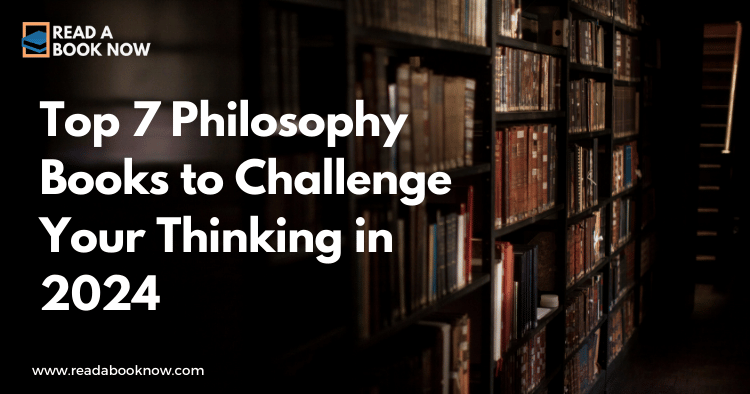Table of Contents
- Introduction
- 1. “Meditations” by Marcus Aurelius
- 2. “The Republic” by Plato
- 3. “Nicomachean Ethics” by Aristotle
- 4. “Being and Time” by Martin Heidegger
- 5. “The Second Sex” by Simone de Beauvoir
- 6. “An Inquiry into the Good” by Nishida Kitarō
- 7. “The Myth of Sisyphus” by Albert Camus
- Conclusion
- FAQs
Introduction
Philosophy isn’t just an abstract exercise; it’s a way to engage with the world, question our beliefs, and challenge our thinking. As we step into 2024, it’s the perfect time to explore some of the most influential philosophical works that can reshape our perspectives. Whether you’re a seasoned philosopher or just dipping your toes into philosophical waters, these seven books will provoke thought and inspire dialogue.
1. Meditations by Marcus Aurelius
Overview
Written as a series of personal notes, “Meditations” provides insight into the mind of one of history’s most famous Stoic philosophers, Roman Emperor Marcus Aurelius. This book encourages readers to cultivate resilience, self-control, and a profound awareness of the present moment.
“Focus on the present. The past is gone, and the future is uncertain.”
Key Themes
- Impermanence: Aurelius reminds us that life is fleeting and that we should focus on the present.
- Self-Discipline: The importance of controlling one’s thoughts and emotions.
- Universal Perspective: Understanding that everyone shares the same struggles and experiences.
Why Read It?
This book is perfect for anyone looking to develop a more grounded and thoughtful approach to life. Each passage serves as a mini-meditation, ideal for daily reflection.
2. The Republic by Plato
Overview
Plato’s “The Republic” is a foundational text in Western philosophy that explores justice, the ideal state, and the philosopher-king concept. Through dialogues featuring Socratic questioning, Plato discusses morality, ethics, and the nature of reality.
“Justice is the virtue of the soul.”
Key Themes
- Justice: What does it mean to be just, both individually and collectively?
- The Allegory of the Cave: A powerful metaphor for enlightenment and the struggle for knowledge.
- The Role of the Philosopher: The necessity for wise leadership in governance.
Why Read It?
Engaging with “The Republic” challenges readers to think critically about their beliefs regarding society, ethics, and governance. It’s a timeless inquiry into what it means to live a good life.
3. Nicomachean Ethics by Aristotle
Overview
In “Nicomachean Ethics,” Aristotle explores the concept of virtue and the path to a fulfilling life. He argues that the highest good for humans is eudaimonia, or flourishing, achieved through virtuous action.
“Virtue lies in our power of choice.”
Key Themes
- Virtue Ethics: Focus on character and the importance of moral virtues.
- The Golden Mean: The idea that virtue lies between extremes.
- Practical Wisdom: The role of practical reason in ethical decision-making.
Why Read It?
Aristotle’s approach to ethics is practical and applicable to everyday life, making it a necessary read for anyone interested in moral philosophy and personal development.
4. Being and Time by Martin Heidegger
Overview
Martin Heidegger’s “Being and Time” is a complex exploration of existence and the nature of being. Heidegger introduces the concept of “Dasein,” or being-in-the-world, challenging readers to consider their own existence.
“To be is to be in time.”
Key Themes
- Being: What does it mean to be?
- Authenticity: The importance of living authentically and confronting one’s own existence.
- Time: How our understanding of time shapes our existence.
Why Read It?
This book is a challenging but rewarding read for those looking to delve into existential questions and the philosophy of being. It encourages deep self-reflection on our place in the world.
5. The Second Sex by Simone de Beauvoir
Overview
Simone de Beauvoir’s “The Second Sex” is a groundbreaking exploration of women’s oppression throughout history. This text is essential for understanding feminist philosophy and gender studies.
“One is not born, but rather becomes, a woman.”
Key Themes
- Existentialism and Feminism: The intersection of these two philosophies through the lens of women’s experience.
- Otherness: The concept of women as the “Other” in a patriarchal society.
- Freedom and Choice: The importance of autonomy and agency for women.
Why Read It?
De Beauvoir’s work remains relevant in contemporary discussions on gender and equality. It challenges readers to think critically about societal norms and the role of women.
6. An Inquiry into the Good by Nishida Kitarō
Overview
Nishida Kitarō’s “An Inquiry into the Good” presents a unique blend of Eastern and Western philosophy. He explores the concept of the “good” through the lens of Zen Buddhism and Western thought.
“The good is the unity of the self and the world.”
Key Themes
- The Good: An exploration of what constitutes the “good” in human life.
- Self-Realization: The importance of understanding oneself in relation to the world.
- The Unity of Experience: How experience shapes our understanding of existence.
Why Read It?
This book offers a refreshing perspective that transcends cultural boundaries, making it an enlightening read for anyone interested in comparative philosophy.
7. The Myth of Sisyphus by Albert Camus
Overview
In “The Myth of Sisyphus,” Albert Camus tackles the absurdity of life and the human condition. He uses the myth of Sisyphus to illustrate the struggle for meaning in a seemingly indifferent universe.
“The struggle itself towards the heights is enough to fill a man’s heart.”
Key Themes
- Absurdism: The conflict between human desire for meaning and the silent universe.
- Rebellion: The act of finding personal meaning despite the absurd.
- Freedom: Embracing life fully in the face of its absurdity.
Why Read It?
Camus’ existential exploration is both thought-provoking and liberating. It encourages readers to confront their own beliefs about life, meaning, and happiness.
Conclusion
Philosophy has the power to challenge our thinking, inspire change, and deepen our understanding of ourselves and the world around us. The seven books listed here are not just significant in their philosophical contributions; they are also gateways to personal growth and reflection. As you embark on your reading journey in 2024, may these works inspire you to think deeper, question more, and engage with the complexities of life.
Also Look For
For further exploration of literary classics that delve into philosophical themes, check out our recommendations on Top 7 Ancient Classics Everyone Should Read Today and 10 Must-Read Feminist Classics That Changed Literature.
FAQs
Q: Do I need a background in philosophy to read these books?
A: No! Many of these works are accessible to beginners, and they can be approached at your own pace.
“Every philosopher was once a beginner.”
Q: Where can I find these books?
A: You can purchase them at local bookstores, online retailers like Amazon, or check them out from your local library.
Q: Are there any companion guides available?
A: Yes, many of these texts have companion guides and summaries available online. Websites like Stanford Encyclopedia of Philosophy provide excellent resources.
“Knowledge is a journey, not a destination.”
Q: How can I engage with others about these texts?
A: Consider joining a local book club or online forums dedicated to philosophy. Engaging with others can enrich your understanding and enjoyment of these works.
As you dive into these profound texts, remember that philosophy is a journey, not a destination. Happy reading!



